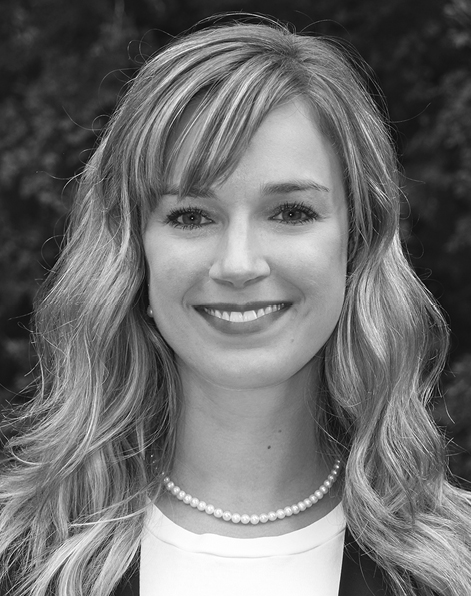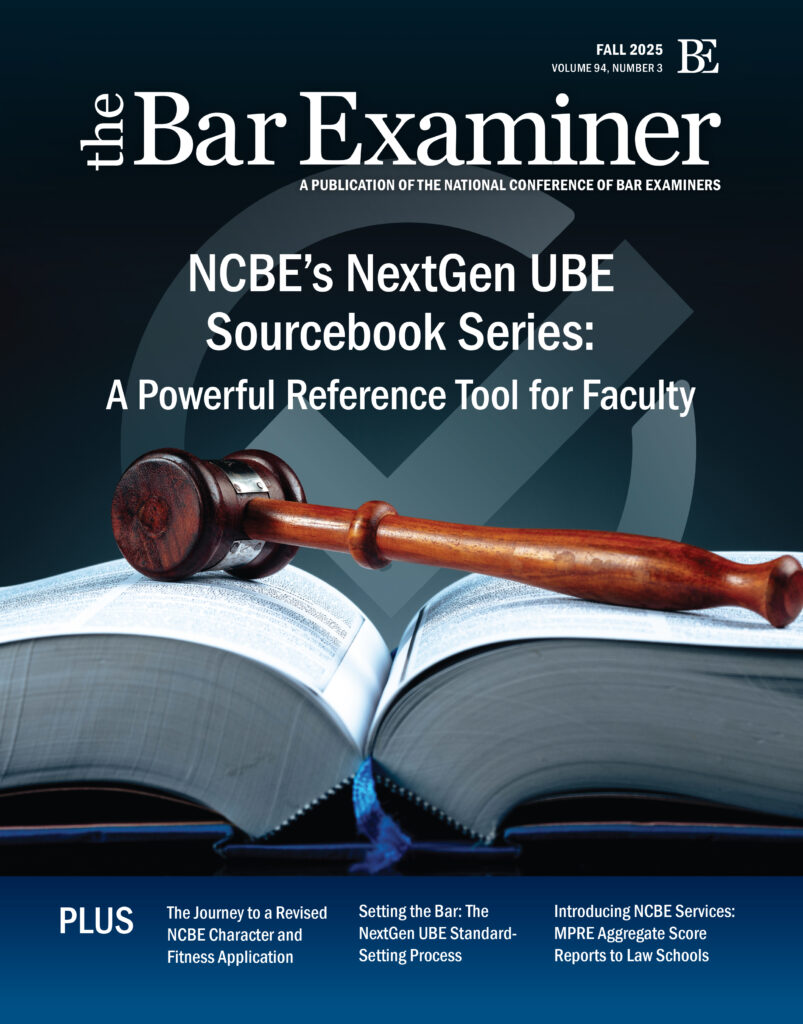This article originally appeared in The Bar Examiner print edition, December 2016 (Vol. 85, No. 4), pp 43–47.
By Kellie R. Early and Jessica GladAdmission on Motion
Reciprocal admission; standing; the Rules Enabling Act; the supremacy clause; the First Amendment; equal protection
NAAMJP et al. v. Jerome Simandle et al., No. 15-3356, 2016 WL 3755782 (U.S. Court of Appeals, 3rd Circuit, 2016)
The U.S. Court of Appeals for the Third Circuit affirmed the dismissal of a suit brought by an attorneys’ group challenging the constitutionality of New Jersey District Court’s Local Civil Rule 101.1, which generally incorporates New Jersey state admission rules by limiting federal admission to those licensed to practice by the Supreme Court of New Jersey.
The lawsuit is one of numerous unsuccessful actions filed by the National Association for the Advancement of Multijurisdiction Practice (NAAMJP) challenging local bar admission rules throughout the country.1 NAAMJP is a nonprofit corporation that advocates “throughout the United States for the purpose of improving the legal profession, by petitioning for admission on motion in the dwindling minority of jurisdictions that have not yet adopted . . . reciprocal admission for all lawyers.”
The present case was brought by NAAMJP and two of its members, Robert Vereb and Benjamin Josef Doscher (“the plaintiffs”). Vereb is an attorney licensed to practice in state and federal courts in New York. Doscher is also licensed in New York State, and is admitted to the bars of several federal courts including the United States Supreme Court and the Court of Appeals for the Federal Circuit. Both plaintiffs assert that they “will apply for admission to the U.S. District Court for the District of New Jersey bar if its admission rule is changed.”
Local Civil Rule 101.1 governs admission to the bar of that court. Section (b) provides that “[a]ny attorney licensed to practice by the Supreme Court of New Jersey may be admitted” to the bar of the District Court. Section (c) states that attorneys not licensed in New Jersey who are members in good standing of another state or federal bar may apply for pro hac vice admission for each case in which they participate in the District Court and pay a $150 fee upon each admission.
Local Civil Rule 101.1 permits certain exceptions from the requirement of admission to the New Jersey State bar. Section (e) allows admission for patent lawyers who are not licensed by the New Jersey Supreme Court, provided that they have been engaged in the practice of patent law in New Jersey, with an office in the state, for at least two years. Additionally, section (j) authorizes any attorney in good standing regardless of state admission to represent any criminal defendant, and section (f) allows any attorney in good standing regardless of state admission to represent the United States.
On June 9, 2014, the plaintiffs filed suit claiming that Local Civil Rule 101.1 violates federal statutory and constitutional law by wrongly preventing certain NAAMJP members from joining the bar of the District of New Jersey. Specifically, the plaintiffs’ complaint included four causes of action, based on alleged violations of the following: (1) the Rules Enabling Act, (2) the supremacy clause of the United States Constitution, (3) the First Amendment, and (4) principles of equal protection.
On September 1, 2015, the United States District Court for the District of New Jersey granted the defendants’ motion to dismiss for failure to state a claim and dismissed the complaint in its entirety. The plaintiffs appealed, and the Third Circuit affirmed, stating that it agreed “with the reasoning of the District Court in all respects.”
Before addressing the substance of the complaint, the court initially rejected the defendants’ assertion that the plaintiffs lacked standing to pursue their claims because Local Civil Rule 101.1 had not caused the plaintiffs any injury. The court reasoned that “Vereb and Doscher are already engaged in the legal profession, admitted to the bar of a neighboring state, and would apply to the District Court bar if the rules were changed to permit their admission. Since denial of their application was assured, the rules inflict the alleged injury regardless of whether Vereb and Doscher actually undertook the futile application process.”
Turning to the merits of the complaint, the court first concluded that Local Civil Rule 101.1 does not violate the Rules Enabling Act, which permits federal courts to prescribe rules consistent with federal laws or rules promulgated under the authority of the Supreme Court. “Local Civil Rule 101.1 does not conflict with any Acts of Congress or any rules adopted by the Supreme Court,” the court stated. “As a result, those local rules do not violate the Rules Enabling Act. The matter is no more complicated than that.”
Second, the court rejected the assertion that Local Civil Rule 101.1 violates the supremacy clause of the Constitution, which ensures that, if federal and state law conflict, federal law controls. The court explained:
The plaintiffs suggest—in a “borderline frivolous” argument . . . —that the District Court’s local rule somehow allows New Jersey state law to control federal courts because it incorporates the state’s attorney admission rules. But that is far from so. Local Civil Rule 101.1 adopts the state standard for attorney admission; it does not allow New Jersey to somehow impose its will on the federal court sitting in that state.
The court also noted that the District Court “is free to change [its] rules at any time, subject to the procedural and substantive limitations of the Rules Enabling Act.”
Third, the court found against the plaintiffs’ argument that Local Rule 101.1 infringes the First Amendment rights to freedom of speech, association, and petition. The court noted that NAAMJP made a nearly identical claim regarding Pennsylvania’s Bar Admission Rule 204 in a suit that was eventually dismissed. “Local Civil Rule 101.1, like its Pennsylvania counterpart, is nothing more than a standard regulation of the legal profession,” the court explained. The court also stated that Local Civil Rule 101.1 places minimal limitations on expressive activities and allows unlicensed attorneys to represent themselves pro se, pass the New Jersey bar examination, or apply for admission pro hac vice on a case-by-case basis. The local rules do not target any speech based on its content or on the viewpoint of the speaker.
Finally, the court addressed the plaintiffs’ claim that Local Rule 101.1 violates the Fourteenth Amendment of the Constitution by denying out-of-state lawyers equal protection of the laws. In rejecting this argument, the court determined that Local Rule 101.1 is subject to rational basis review, rather than strict scrutiny. “The rule treats attorneys differently based upon whether they are admitted to the state bar of New Jersey,” the court stated. “It neither burdens a fundamental right nor targets a suspect class of people.”
The court went on to conclude that Local Rule 101.1 does not violate the equal protection rights of out-of-state attorneys. The court reasoned that the federal District Court’s preference for state-barred attorneys as reflected by Local Rule 101.1 is rationally related to determining an attorney’s fitness to practice law before the District Court, protecting the public interest, and ensuring that attorneys are familiar with state law.
The court summarized the reasons for its decision by stating that the District Court’s local rules for attorney admission do not conflict with federal law and “are neither unique nor particularly restrictive.”
Note
- A prior lawsuit filed by NAAMJP was reported in an earlier issue of the Bar Examiner (Vol. 82, No. 4, December 2013, National Association for the Advancement of Multijurisdiction Practice v. Berch, 2013 WL 5297140 [AZ 2013]). In that case, the U.S. District Court for the District of Arizona upheld the constitutionality of Arizona’s admission on motion rule, Arizona Supreme Court Rule 34(f)(1), which grants reciprocal admission to lawyers from states providing the same privilege to Arizona attorneys but requires lawyers from non-reciprocal states to take the Uniform Bar Examination to gain admission to the Arizona Bar. (Go back)
Bar Examination
Foreign-educated applicants; eligibility; educational evaluation; equitable estoppel
Young Wook Kim v. Tennessee Board of Law Examiners, No. M2016-00621-SC-BAR-BLE (TN 2016)
Mr. Young Wook Kim received a Bachelor of Laws degree from Chung-Ang University in Seoul, Korea, in 2003. He received an LL.M. degree from the University of Southern California Gould School of Law in May 2014. He is not licensed to practice law in Korea or any other jurisdiction. He applied to take the July 2014 Tennessee bar examination, sat for the examination, and did not receive a passing score. He applied to retake the examination in July 2015. Amendments to Tennessee Supreme Court Rule 7 regarding educational requirements to take the examination became effective with the July 2015 examination, and it was noted in the application form that the requirements applied to “all foreign-educated applicants, even those who sat for or have been previously approved to sit for the exam.”
Among the new requirements was a course-by-course evaluation of the applicant’s foreign legal education by either World Education Services (WES) or Educational Credential Evaluators, Inc. (ECE). Kim requested WES to provide the evaluation. WES concluded that Kim’s Bachelor of Laws degree from Chung-Ang University was equivalent to a bachelor’s degree in the United States. The Tennessee Board of Law Examiners (BLE) notified Kim that he was not eligible to take the July 2015 examination because he did not meet the educational requirements of Rule 7 of being awarded both a bachelor’s degree and a law degree.
Kim re-applied for the February 2016 examination. The BLE notified him that he was not eligible to take the examination without completing additional education. Kim filed a petition requesting reconsideration, and the BLE denied his petition. Kim filed a petition for writ of certiorari in the Tennessee Supreme Court. The Clerk of Court issued the writ, and the BLE filed the administrative record in response.
The Court reviewed the provisions of Rule 7, sections 2.01, 2.02, and 7.01, and concluded that the rule “plainly require[s] that an applicant have obtained both an undergraduate degree and a law degree in order to be eligible to take the Tennessee bar examination.” The Court then noted that it was “undisputed that Mr. Kim obtained only one degree, . . . , which is the U.S.-equivalent of a bachelor’s degree,” and found that the BLE did not err in denying Kim’s application to take the February 2016 examination.
The Court considered and rejected Kim’s argument that the BLE should be estopped from reversing its earlier determination, in connection with his application to take the July 2014 examination, that he met the requirements of Rule 7. The Court noted that the application form clearly put Kim on notice that the new evaluation of a foreign-educated applicant’s education would be performed, even for applicants previously approved. Further, the Court rejected the applicability of the estoppel doctrine to acts of public officials or agencies in the absence of exceptional circumstances, and found that there were no exceptional circumstances in Kim’s case. Finally, the Court rejected Kim’s arguments that the BLE improperly delegated its responsibility to an outside agency, WES, to determine Kim’s eligibility, and that the BLE acted arbitrarily and capriciously in reversing its 2014 determination. The Court found that the record did not indicate that the BLE delegated the decision to WES; rather, the BLE simply required “an education evaluation report by a professional agency specializing in such evaluations” to assist the BLE in making its determination. The change in the educational evaluation process was reasonable because the reports provide the BLE with more comprehensive information about applicants’ educational background. The fact that the new process led to a different outcome for Kim did not lead to the conclusion that the BLE acted arbitrarily or capriciously. The fact that the outcome could be different for any applicant previously approved was made clear in the application form by the statement that the new process was required for all applicants, including those previously approved.
The Court affirmed the BLE’s denial of Kim’s application to take the Tennessee bar examination on the ground that he did not demonstrate that he met the educational requirements of Rule 7. Costs were taxed to Kim and his surety.

Kellie R. Early is Chief Operating Officer for the National Conference of Bar Examiners.

Jessica Glad is Staff Attorney for the National Conference of Bar Examiners.
Contact us to request a pdf file of the original article as it appeared in the print edition.







